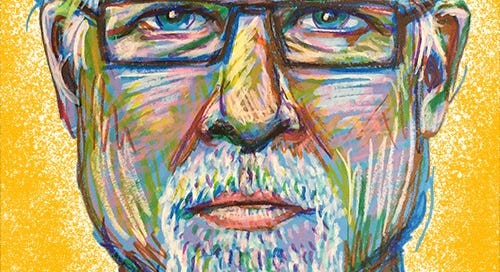Is American Politics Anti-Human? (Part II)
What's to stop some selfish bastard from taking over a band of foragers?
This material is adapted from Civilized to Death.

Given a full chance to act in his own interest, nothing but expediency will restrain [a man] from brutalizing, from maiming, from murdering—his brother, his mate, his parent, or his child. Scratch an “altruist” and watch a “hypocrite” bleed.
—Michael Ghiselin, The Economy of Nature and the Evolution of Sex
In one of the most underlined passages of one of the most influential nonfiction books of the past century (The Selfish Gene), Richard Dawkins implores us to attempt to outwit what he sees as our deeply rooted, natural tendencies: “Let us try to teach generosity and altruism,” he writes, “because we are born selfish. Let us understand what our own selfish genes are up to, because we may then have a chance to upset their design, something which no other species has ever aspired to.”
Stirring rhetoric, but if genes are inherently selfish, and we share roughly 98 percent of ours with chimps and bonobos—and a slightly lower percentage with other mammals—how could our altruism be a triumph over our genetically programmed nature, while the altruism documented among ants, dolphins, bees, herd animals, and many primates be somehow congruent with their genetic input?
Although Dawkins is probably the greatest living popularizer of Darwin’s work, their views of human nature appear to be worlds apart. Dawkins’s human exceptionalism contrasts with Darwin’s central conviction that “the difference in mind between man and the higher animals, great as it is, certainly is one of degree and not of kind.”
It’s tempting to think Dawkins meant it all metaphorically, but no. In The Selfish Gene, he is clear that he believes the selfishness of humans to be innate and encoded in our DNA. Dawkins views human beings as “survival machines—robot vehicles blindly programmed to preserve the selfish molecules known as genes,” and the world of those genes is one of “savage competition, ruthless exploitation, and deceit.” As goes the gene, so goes the man, because “this gene selfishness will usually give rise to selfishness in individual behaviour.”
Ultimately, for Dawkins, “blindness to suffering is an inherent consequence of natural selection,” but Darwin would have disagreed, as he believed that compassion and altruism conferred a clear evolutionary advantage on social animals. In his notebooks, Darwin observed, “Looking at Man, as a Naturalist would at any other mammiferous animal, it may be concluded that he has parental, conjugal and social instincts . . . these instincts consist of a feeling of love or benevolence to the object in question . . . such active sympathy that the individual forgets itself, and aids and defends and acts for others at his own expense.”
These ideas persisted in Darwin’s thinking throughout his life and were expressed perhaps most eloquently in The Descent of Man and Selection in Relation to Sex, published eleven years before his death, where he tells the story of a zookeeper he met:
Several years ago a keeper at the Zoological Gardens showed me some deep and scarcely healed wounds on the nape of his own neck, inflicted on him whilst kneeling on the floor, by a fierce baboon. The little American monkey who was a warm friend of this keeper, lived in the same compartment, and was dreadfully afraid of the great baboon. Nevertheless, as soon as he saw his friend in peril, he rushed to the rescue, and by screams and bites so distracted the baboon that the man was able to escape.
For Darwin, this cross-species selflessness was no aberration, but an expression of something fundamental in social species.
Many a civilized man who never before risked his life for another, but full of courage and sympathy, has disregarded the instinct of self-preservation and plunged at once into a torrent to save a drowning man, though a stranger. In this case man is impelled by the same instinctive motive, which made the heroic little American monkey, formerly described, save his keeper by attacking the great and dreadful baboon.
But for Dawkins, Steven Pinker, and other neo-Hobbesian thinkers, evolutionary advantage goes not to the altruist, but to the “selfish rebel.” Dawkins lays this out clearly in The Selfish Gene:
Even in the group of altruists, there will almost certainly be a dissenting minority who refuse to make any sacrifice. If there is just one selfish rebel, prepared to exploit the altruism of the rest, then he, by definition, is more likely than they are to survive and have children. Each of these children will tend to inherit his selfish traits. After several generations of this natural selection, the “altruistic group” will be over-run by selfish individuals, and will be indistinguishable from the selfish group.
This hypothetical scenario is foundational to the Narrative of Perpetual Progress (NPP) and to the “rational self-interest” considered fundamental to capitalism. The mantra is repeated, virtually word for word, in any number of books and lectures. “Unless a group is genetically fixed and hermetically sealed,” writes Pinker, “mutants or immigrants constantly infiltrate it. A selfish infiltrator would soon take over the group with its descendants, who are more numerous because they have reaped the advantages of others’ sacrifices without making their own.”
Keep reading with a 7-day free trial
Subscribe to Tangentially Speaking with Chris Ryan to keep reading this post and get 7 days of free access to the full post archives.



